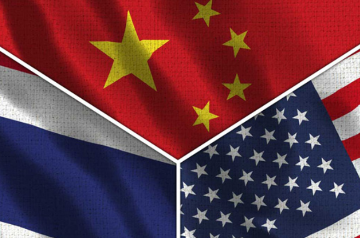"The 'Tamil Nadu factor' in the Centre's Sri Lanka policy, aided and possibly abetted by the Sri Lankan Tamil Diaspora inputs and resources, may have flagged a discourse on 'multiple identities' in contemporary Indian context. Given the increasing efforts, post-CHOGM, to advance the pressures that are bound to build on India ahead of the March UNHRC session in Geneva, the question arises how far and how fast India and Indian States need to address the issues and concerns involved.
The 'multiple identities' of the Tamil-speaking people in the country have suddenly acquired an urgent need for mutual understanding between the State and the citizen. There are contextualised circumstances, which may not provide for a yard-stick to measure 'national interests' or prioritise them. The constitutional scheme confers the responsibility on the Union, but with the implied responsibility of carrying all regions and sections of the people with it. Yet, what is the 'larger responsibility' of the Indian State in the context of the multiple identities of its citizens, particularly when those identities get prioritised in ways that are at times seen as subverting, rather than sub-serving the larger 'Indian identity'?
The country has often debated this issue from time to time, in the context of the 'Kashmir issue' (which continues to date, to a greater or a lesser degree), the 'Punjab issue' and various socio-political issues in the North-East and elsewhere in the country. The 'anti-Hindi agitation' in Tamil Nadu, then Madras State, in the Sixties also came to acquire a distinct flavour of the kind. It may not have come to that stage as such in this particular case, but then questions may have to be asked and answered in good time, if the Indian State were to formulate a 'theoretical construct' in context for future consideration and decision-making, if not for stereotyped application elsewhere in the future.
How far, how fast?
It is in this background and context that the existing efforts and emerging trend to globalise the Tamil political identity needs to be considered. Even in the oft-mentioned Sri Lankan context, such 'multiple identities' of the Tamils, on either side of the Palk Strait, when 'Indian Tamils' were rendered Stateless and disenfranchised long before the 'Sinhala Only' language issue snowballed into 'the national problem' of the island-nation. It was true during the forced exodus of Tamils along other Indians from Myanmar, then Burma, or even during the decades-old anti-Hindi agitation in Tamil Nadu, then Madras Presidency first and Madras State, post-Independence.
The Canadian Prime Minister Stephen Harper's boycott of CHOGM-2013 in the Sri Lankan capital, the last-minute boycott by Mauritius counterpart Navin Ramgoolam, and also their British counterpart David Cameron's diatribe against the Sri Lankan State during his CHOGM visit, had as much to do with the Sri Lankan Tamil Diaspora constituency nearer home as the allegations on 'accountability' front. While Canada is a 'multi-ethnic' community almost from commencement, the UK is not. It will be interesting to note, how far and how fast the country travels in that direction, if the local SLT constituency changes gear from 'accountability issues' to something more substantive and equally controversial - hence, sensitive. Sri Lankan media reports have spoken about a memorial being unveiled for the LTTE's dead in Mauritius - putting their numbers at a high 160,000-plus, four times the one given in the externalised Darusman Report, commissioned by UN Secretary-General Ban Ki-moon, up in turn from the original UN ground reports that had put the figure below 8,000.
In India, local 'Tamil identity' has at times come to be used not to contextualise the Union Government's positions on the Sri Lankan ethnic issue, war and violence. Instead, it has acquired a tendency to cross the thin-dividing line, to contest, if not conflict with the Indian State, nation and identity, contrasting it not only with the 'Tamil identity' of the citizens from Tamil Nadu, but also with the 'Tamil nation' identity of the 'Tamil nationalist' groups in Sri Lanka and their Diaspora elsewhere. Inter-State river waters disputes have come to replace the post-Independence slogan, 'North is flourishing, South is suffering'.
In Chennai recently, former Mauritian Education Minister Armoogum Parasuramen, who is also the head of the Mahatma Gandhi Institute there, said that a three-day International Tamil Conference will be held in that country by the middle of next year. The local media quoted the Minister as saying that the conference aims at bringing together the Tamil Diaspora settled across the globe, the local media quoted him saying and adding, "Although many have been proselytised to the prevalent religions of the host countries, their culture remains largely the same."
A welcome way to celebrate the cultural identity of the Tamil-speaking people(s) that is (not always) a hidden layer in the 'multiple identities' of the community, a conference of the kind in recent years have however been used by some of the participants at least to discuss - but not debate -- the 'Tamil national' agenda in the Sri Lankan context and the 'Tamil nationalist' agenda in the global context. Such interactions at conferences or through the contemporary tools of 'digital explosion', including the social media, have often ended up centring on the 'Tamil nationalist' identity of the Tamil-speaking people in India, contrasting it with, rather than contextualising it to the larger Indian identity.
Claims on Wikipedia put the number of Diaspora Tamils outside of India and Sri Lanka at anything up to 100 million, or 10 crores, settled in over 70 countries across the world. Piloting a resolution (passed unanimously) in the Tamil Nadu State Assembly, urging the Union of India to boycott the upcoming Commonwealth Summit in the Sri Lankan capital of Colombo in mid-November, Chief Minister Jayalalithaa recently referred to the 'sentiments' of the eight-crore, or 80-million Tamil population in the country as the reason and justification behind the demand. The population of Tamil-speaking people(s) in neighbouring Sri Lanka, comprising Sri Lankan Tamils, Indian-origin Tamils and Muslims, add up to half a million.
Jayalalithaa's observations, often times repeated by political rivals and compatriots in the State, may be a statement of a fact. So may be the recent observations of senior leaders of the ruling Tamil National Alliance (TNA) in Sri Lanka's Tamil-majority Northern Province, where an elected Government assumed office only recently. The current proposition, which inter alia argues that the Tamils in Sri Lanka had gone to that country from India, goes against the grain of earlier arguments that they are as much sons of the soil as the Sinhala-Buddhist majority. In other times, 'Tamil nationalist' groups in Sri Lanka would have contested such claims without any loss of time whatsoever.
There is more to it than meeting the eye, as 'competitive' peripheral pan-Tamil politics in and of Tamil Nadu, with its relatively long history has often led to targeted violence against the Indian State, which cannot be compared with even greater violence on domestic issues and local demands. The recent 'Molotov cocktail' attacks on post offices in Chennai to dissuade the Centre and Prime Minister Manmohan Singh from participating in CHOGM-2013 may be an exception, but cannot be ignored, either.
Question should thus be asked about the motive, relevance and purpose for a (privately-funded) 'Mullivaikkal memorial' for the 'dead Tamils' of Sri Lanka in central Tamil Nadu, where the presence of a large concentration of places of worship of different faiths - many of historic Chola vintage, dating back to a millennium -- has the potential to attract Tamil-speaking people from across the world, annually and periodically - and the use to which such 'landmarks' could be put to use in the context of the 'global Tamil political identity'.
That the State Government woke up belatedly, after the delayed private party approach to the Madras High Court Bench at Madurai to have the inauguration cancelled did not produce the requested results, only gave avoidable publicity. Incidentally, the stake-holders in Sri Lanka have not forgotten the Chola influence/interference with their domestic polity and history. Nor has the present generation forgotten what possibly may be an unintended linkage - of the LTTE adopting the Chola's 'Tiger' standard as their symbol.
Subservient national identity
Going beyond the 'multiple identities' that has relevance and meaning in the existing and emerging global contexts, such efforts, if encouraged, also has the possible potential to confuse the 'global Tamil political identity of the people of Tamil Nadu with the common and comparatively less virulent 'Tamil cultural identity' and against the larger 'Indian identity'. With the result, the Indian discourse on the pan-Tamil global identity could end up being guided and conducted by peripheral group(s) of 'Tamil political nationalists' in India but more so by the Sri Lankan Tamil Diaspora.
There is now the possibility - or, is it a danger? -- of individual community and national identities being rendered secondary and even subservient to the 'global identity' not in the way the image of the 'global citizen' is being sought to be painted and evolved - but in terms of religion, ethnicity, language, culture and such other marks and brands. The more famous or infamous 'global identities' can be the touchstone for cross-verification, to evaluate the plus-and-minus derived from the same, to guide the 'multiple identities' in ways that they do not contradict with the more specific and relatively more relevant 'national identity' and the like, but can still co-exist without challenging and subverting the rest.
(The writer is a Senior Fellow at Observer Research Foundation, Chennai Chapter)
"
The views expressed above belong to the author(s). ORF research and analyses now available on Telegram! Click here to access our curated content — blogs, longforms and interviews.




 PREV
PREV


